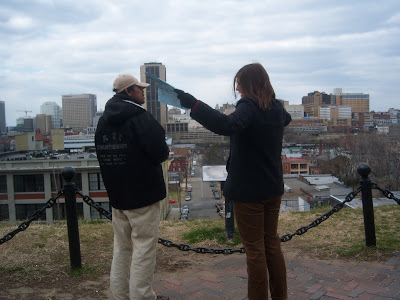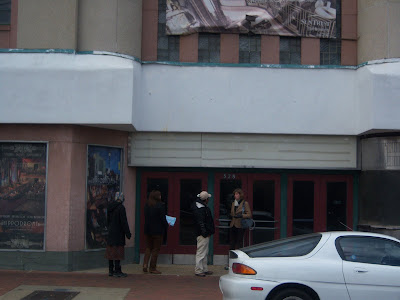Kovit arrived in the US on December 20th, 2008. It was his birthday, and what better gift than finally getting to have this experience, an experience that ENGAGE and Kovit have been planning for a long time? What I didn't realize when I undertook the role of coordinating his stay here was that Kovit's trip to the US is also a gift for ENGAGE. Since he's been here, he has pushed Shin and myself to develop our organizing skills, think critically and realistically about how we function as an organization, and the potential we have to empower people's movements in the US through the relationships we hold with all of our members, all of you.
Let me take you back to where we were when Kovit first arrived, where we have come, and what the future holds. Below are the notes from our initial discussion when Kovit arrived at the ENGAGE staff apartment in DC:
-- -- --
Kovit Goals
* Support ENGAGE concretely
o Work with ENGAGErs to understand where/who their community is.
o Create international alliances (priority 2) e.g. Spartanburg – Khon
Kaen exchange
o Build local initiatives (priority 1) e.g. Help Allyn get a team together
* Support NGO-CORD
o build linkages between organizations in US/Thailand for coordinated
action in the future
o Learn how organizations and organizers organize at the grassroots level
to think about ways to help create in target groups a sense of ownership
of the movement/projects.
* Support CIEE
o Help students get more prepared before they leave, make orientation
easier for stuff
+ e.g. Small forum with departing students in the US
# language, culture, and program philosophy training before
they leave
* Personally
o Advance a level and a half in English
Josh Goals
* Become better facilitator of experiences for others
* Make sure Kovit is fulfilling his goals and fulfilled inside
* Maintain good communication between all parties involved; Kovit, CIEE,
ENGAGErs, allies
ENGAGE Goals
* Build and deepen the relationships ENGAGE has with communities in US/abroad
* Create new relationships with organizations/people
* Get ENGAGE members excited/reinvigorated
* Connect individual ENGAGErs to local initiatives in the US
* Reflect and show how much ENGAGE has grown until and throughout the Kovit tour
o Everything shall be documented!
Above all else
* Make sure we are working well together – i.e. We must have a functioning,
participatory, group process
-- -- --
These goals are what guided us in our initial plans, and I think many of them have been successful. For example, Kovit has gained a better understanding of what it means to be an organizer in the US, and will be gaining even more insight as his travels continue and he spends time with people who are doing really cool things.
Kovit has been traveling for the last month, spending time outside of Boston, in Nicaragua and now in Minnesota. Before all this, he traveled to New York City and Richmond, VA. All these trips have happened because of the awesome people we have in those locations, and in the case of Nicaragua, because of a relationship we have with the program through one the current interns with the CIEE Thailand program. In between he's been staying in DC checking in, catching up with us and on his sleep, and thinking about ENGAGE.
With Kovit in Minnesota right now, I've had some time to think about his trip so far and where it's going. There are many things that I think have been going excellently, others not so great, moments I'm proud of and worries about what's to come. This post is a chance for me to put my thoughts into words so that everyone can see them, and to provide some highlights of the trip so far.
Since getting here, Kovit has really had the chance to gain an understanding on ENGAGE. Like many of us when we first heard about ENGAGE, and many of us still, Kovit's understanding was really on the surface. The ideas, the principles, the concept is genuine and huge, but the reality of enacting them, of seeing them in action is more difficult. What does it mean to say we support our members and how do we do it? Now, with Kovit's help, we are trying to foster the relationships necessary to be successful, and create the space for tangible and sustainable actions. I myself have gained a better understanding of ENGAGE and its potential with Kovit, and my hope is that everywhere he goes and everyone he sees has the chance to do the same.
One of the coolest things to have happened so far is the number of ENGAGArs from all walks of life have spoken up to help plan trips, find out what's going on with Kovit and the communities he works with, and simply to spend time and reminisce about old times. This has been a great thing to experience. It is rare, I think, to find an organization that links not only cross-culturally and globally, but also dissects so many generations of students.
Kovit's english skills have also improved, and I am proud every time I watch him holding a good conversation in english with someone who has probably never heard a Thai accent before. he's been spoiled somewhat by the number of people he's spent time with that are fluent Thai speakers, but that's not an option everyone he's been or will be going, and he does better than I would be to do in Thailand with what I know. Hopefully this will help Kovit in his future goals of building stronger international relationships.
Despite all the successes of his trip so far, there have also been weaknesses that we hope to strengthen. Much of his early trip here was spent exchanging with organizations in DC, but much of what we did was on the surface. While he's here, Kovit really wants to dig deep and develop understandings and relationships with people that will last a lifetime. This is something that we are trying hard to do with those tangible actions mentioned above.
For example, in DC, we are working on setting up an internship between ENGAGE and an organization of day laborers. This is, as always, based off of a relationship that an ENGAGEr has with the community, and a great way to plug current and returning study abroad students into actions in the US where they can utlize what they learned while abroad. We hope that other opportunities like these arise, and will keep you posted on them as they come.
And lest you think that ENGAGE and Kovit are the only beneficiaries of his trip here, that would not follow one of the models ENGAGE is defined by. The exchange of information is always important in how we approach the world. With that in mind, on his many trips and in DC, Kovit has had the opportunity to share his experiences and knowledge with students, community leaders and organizers, friends, and anyone who is interested. People who have never had the chance to study abroad at least get a new perspective on the world, and organizers learn about a different model of people's movements. Hopefully these exchanges instill some insight and strengthen movements here. They've also given some ideas for Kovit to take back to Thailand and try out with the communities he works with there. In case you're interested, I've posted a couple of flyers from speaking events he's done on the ENGAGE wiki. One is from Brandies University and the other from EMPOWER DC. Others may post their flyers as well if they'd like. These can be found
here.
Now, I hope that provides at least somewhat of an update about what's been going on. I'm sure I could keep going on and on, but no body wants to read a novel of run on sentences. I actually love talking to people much more and would love to catch up one-on-one if you'd like, simply e-mail me at josh@engagetheworld.com and we could set something up.
Before I part, here is what the future holds. Kovit will be in Minnesota through the 20th, spending time with the White Earth Land Recovery Project (http://nativeharvest.com/). He will also potentially meet with staff members from the Center for Global Education: Mexico program that ENGAGE has been building a relationship with over the past couple of years. It should be a great way to further solidify this relationship. After Kovit return from Minnesota, Kovit will be traveling with Shintaro to Mexico to do some reentry work with students from the CGE program and the International Honors Program: Rethinking Globalization, another program that we have been working with. Upon his return from ten days in Mexico, Kovit will spend a little time in DC checking in, and then heading down to Spartanburg, SC. He'll be working with SEEC and helping plan the convergence. Hopefully, Kovit's time there will help SEEC grow and give Kovit some great experience in grassroots organizing ENGAGE style!.
After the convergence, I will be heading off to Thailand, and this is where my worries arise. To continue creating the space for these experiences for Kovit's last six months, somebody will need to take the reigns and help plan for the future and be on the ground to keep things moving along. So far, no one has been able to make the long-term commitment, and we are still searching. If you are interested in getting involved, please e-mail me ASAP so we can start a conversation!
And with that, I will leave you until the next update!
as always, peace and love









